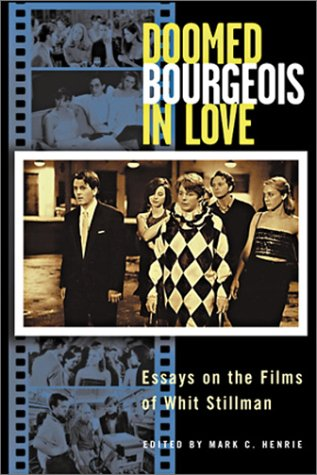
“Whit Stillman has claimed that he does not want to make serious dramas, only comedies. This does not mean, however, that his work has no serious intention. Critics have classified his three films, Metropolitan, Barcelona, and The Last Days of Disco, as comedies of manners, and are reminded of Jane Austen. And well they might be, for Stillman has admitted that Austen, along with Tolstoy and Samuel Johnson, are the authors he loves most. A comedy of manners, according to the dictionary definition, is a satirical treatment of conventional or fashionable society. Satire arises when an author places an outsider among those who take the fashions, customs, and attitudes of their class for granted, allowing the audience to see conventional society from the outsider’s perspective. In Austen’s Pride and Prejudice, for example, we watch along with Mr. Bennet the absurdities of his wife’s efforts to introduce their daughters into fashionable society. Comedy lies in the discrepancy between that society’s understanding of itself and what the outsider sees. In a way, a comedy of manners portrays fashionable society itself as a version of the classic comic figure, the boaster, at whom the audience laughs when the discrepancy between his pretensions and the truth comes to light.
“Comedies of manners, however, need not be simply critical of the manners they satirize. While the English society of Pride and Prejudice offers us the hypocritical Miss Bingley, it also offers us Mr. Darcy, whose character and life reveal a sensitivity and moral worth inconceivable without society. Elizabeth Bennet may be an outsider whose keen perception penetrates Miss Bingley, but then so is Elizabeth’s sister Lydia, whose scorn for conventions leads to disgrace. Nor is it possible to understand Stillman’s comedy without exploring the ambiguity of his attitude toward his characters, captured by one reviewer as ‘mocking affection.’
“In Metropolitan, we see a group of Manhattan socialites through the eyes of outsider Tom Townsend (Edward Clements), a Westsider among the Eastsider elites, a disciple of the French socialist Charles Fourier, a reader of Thorstein Veblen, and one opposed to debutante parties on principle. One of the debutantes of the group, Audrey Rouget (Carolyn Farina), is herself a kind of outsider, due in part to her love of Jane Austen. When Tom objects that ‘everything Jane Austen wrote seems ridiculous from today’s perspective,’ Audrey is quick to respond: ‘Has it ever occurred to you that today, looked at from Jane Austen’s perspective, would look much worse?’ By the end of the movie, Tom comes to appreciate Austen, Audrey, and his new friends.
“In Barcelona, Ted and Fred Boynton (Taylor Nichols and Chris Eigeman) are American innocents abroad, one in the office of an American company in Barcelona, the other a naval officer on a diplomatic assignment there. However much they try to belong to the Spanish social scene, they are bourgeois Americans trying to negotiate European culture and corruption, as well as anti-American political sentiment. Their unsophisticated tastes and sexual mores, their capitalist values, their American patriotism, and even their old-fashioned piety at first appear ridiculous, especially in the eyes of their Spanish friends, but ultimately constitute their solid human decency. The movie suggests a bridge between the two cultures when Ted’s business requires commuting between Barcelona and Chicago, and eventually both Ted and Fred marry foreign women and bring them to the States.
“The preppies of Metropolitan have become yuppies in The Last Days of Disco, and they frequent an exclusive Manhattan disco club. They are all now more or less outside, constantly trying to get into the Club. Even the Club’s underboss occupies a precarious status, constantly risking his job by admitting friends through the back door. Stillman presents the conventions of disco culture, and the social craze it represents, as ridiculous, and certainly as morally questionable as the fashionable society of Austen’s novels. But while the fashions of any age may be limited and timebound, Stillman lets us see the human aspirations moving his characters’ attraction to disco, just as Austen herself illustrates the moral benefits of social conventions.”
— from Mary P. Nichols, “Whit Stillman’s Comic Art,” in Doomed Bourgeois in Love: Essays on the Films of Whit Stillman, edited by Mark C. Henrie (ISI Books, 2002). The Friday Feature for January 26, 2024 presented an interview with Henrie about this book, recycled from Volume 54 of the Journal.